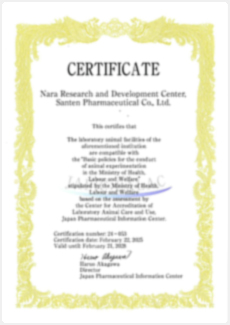In addition, all animal-testing plans at Santen, including plans for experiments outsourced to external parties, are subject to evaluation by the Animal Testing Committee, which comprises (1) members with excellent expertise mainly in animal testing, (2) members with excellent expertise in laboratory animals, and (3) members with knowledge and experience in other fields. Furthermore, we have formulated in-house rules in conformity to the Japanese Act on Welfare and Management of Animals, the Japanese Ministry of the Environment's Standards for the Rearing and Storage of Laboratory Animals and the Alleviation of Their Pain, and the Basic Guidelines for Proper Conduct of Animal Testing and Related Activities at Organizations under the Jurisdiction of the Japanese Ministry of Health, Labour and Welfare.
We secure necessary rearing spaces for each animal species in consideration of animal welfare, and practice behavioral enrichment to lessen the animals' stress. To increase employees' knowledge and awareness of the welfare of laboratory animals, we have continued to provide all employees involved in animal testing with education and training every year and keep records thereof.
We also strive to ensure transparency concerning the appropriate operation of our animal testing facility in consideration of animal welfare and the appropriate planning and implementation of animal testing with respect for the above 4Rs. The Nara Research and Development Center, Santen's only animal testing facility, has been accredited as a compliant facility as a result of assessment by the Japan Pharmaceutical Information Center's Animal Testing Facility Accreditation Center, which carries out external inspections of animal testing facilities in terms of whether they conduct appropriate scientifically based animal testing in consideration of animal welfare.
Before outsourcing animal testing, we confirm that the counterpart research facilities have received third-party animal welfare accreditation from the Association for Assessment and Accreditation of Laboratory Animal Care International (AAALAC International) or the Japan Pharmaceutical Information Center's Animal Testing Facility Accreditation Center, and that the accreditation is still valid. When we outsource university or other research facilities without third-party accreditation, the Nara Research and Development Center's Animal Testing Committee examines whether the animal testing is appropriately planned from the perspective of animal welfare, before the testing is started.
The number of animals used for all in-house and outsourced animal experiments planned by the Nara Research and Development Center has been continuously monitored. Despite short-term fluctuations, the number has been declining from a long-term perspective as a result of animal testing planning based on the principles of the 4Rs.
